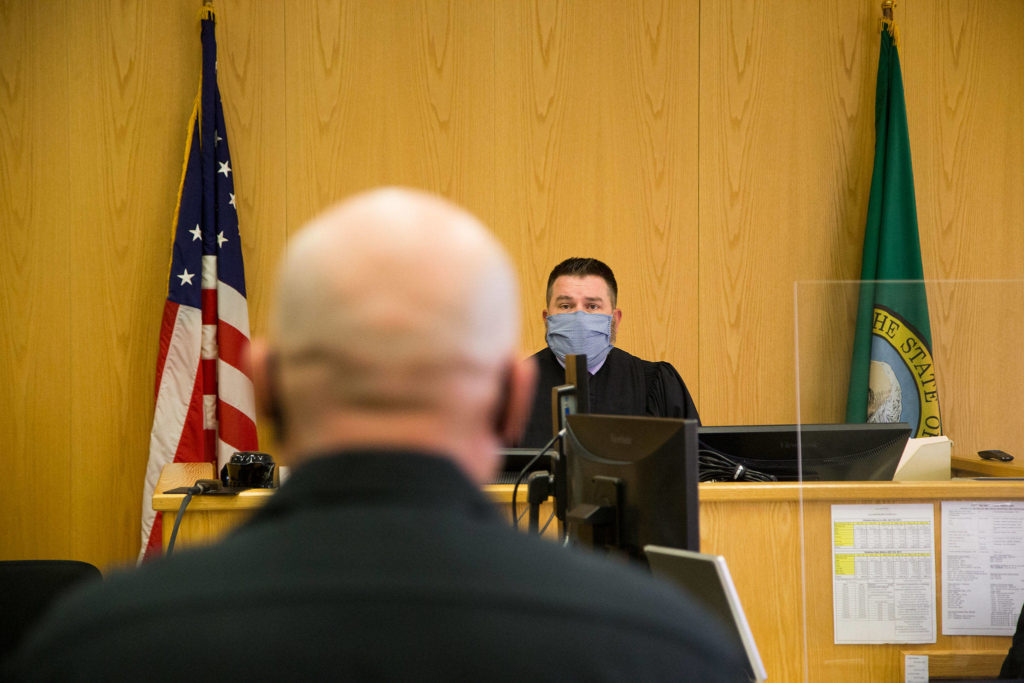EVERETT — At the age of 21, when he was arrested yet again, Benjamin Stum cried so hard his face swelled and flushed red for the booking photo.
All his dreams of the future seemed to be crumbling on Oct. 5, 1999. So much time has passed he’s not sure what he was arrested for — maybe for having some pot, he suggested.
Stum, of Everett, spent the next 20 years homeless, addicted to drugs and alcohol, with untreated mental illnesses. Police knew his face all around Snohomish County.
His booking photos — all 29 of them — tell a story of a person in a hopeless cycle: arrest, release, repeat.
Over the years, Stum’s hairline recedes, and eventually disappears entirely. He grows some stubble, later a goatee. He shaves it, grows it back. He becomes thinner, then stockier. The first photo shows a defiant teenager. The last shows a grown man in his 40s, worn down and broken.
There’s a story to each mug shot in between.
He cut his forehead July 30, 2013, when he hit his head on a mailbox earlier in the day, he said.
The next year, a police dog bit him when he ran. He sported a split lip in the photo Nov. 1, 2014, but that’s likely from smoking meth, he said.
Bloodied bruises decorated his face Feb. 12, 2017. He’d been arrested for assault and resisting arrest. He can’t remember what happened.
After 1999, he never cried again in front of the camera. You don’t cry, Stum said. It shows weakness.
In most photos, he has a blank expression. In one, he smirks. In another, he grins — because a jail guard told a joke, he said. In a photo from a negligent driving arrest on March 11, 2017, he folds his arms and averts his eyes. Sometimes his gaze is distant.
For Stum, the photos don’t tell the full story. This isn’t about a man being trapped in the cycle, but what it took for him to escape it.
On a cold winter day in February 2019, Stum finally had enough of living outside, alone, imprisoned by addiction. He admitted himself to the hospital.
But Stum couldn’t do it alone. He needed the system to work with him. A public defender, a prosecutor and a judge offered him a chance to avoid felony charges and address the roots of his behavior, if he enrolled in the county’s Mental Health Therapeutic Court.
Around the age of 41, he would learn for the first time that he has depression, anxiety, post-traumatic stress disorder and bipolar disorder. He learned to manage his mental health, and to take medicine that isn’t alcohol or street drugs.
When he graduated from mental health court a year ago, Everett District Court Judge Anthony Howard put up Stum’s first booking photo, from a 1997 domestic violence arrest. Back then he still had a head of bright blond hair, and a little acne.
“What message I wanted to send to him was that I really feel like as a judge, and as a representative of the criminal justice system in the county — I feel like we failed this kid,” Howard said. “If we had intervened with this type of program back then, we wouldn’t have all of this. We wouldn’t have paid the hundreds of thousands or millions of dollars it took to put this kid through the criminal justice system over 20 years, over and over and over again, without dealing with the underlying mental health.”
‘That was me’
The first time Stum drank alcohol, he was 15 or so. He was chugging beers with friends, hanging out somewhere on Ebey Island. He eventually grew obsessed, then addicted.
“I couldn’t stop drinking,” he said. “… I would always lose a job. I wasn’t able to keep friendships.”
Around the time of his first arrest, he was kicked out of his family’s house. He lived alone in a tent, getting by with skills he acquired in the Royal Rangers — a church version of Boy Scouts where they wear berets, “like special forces,” Stum said.
He got in trouble, a lot.
In all, Stum has been convicted of more than 30 misdemeanors and four felonies. Often he was charged with having drugs, criminal trespassing or driving with a suspended license. Other times, he was booked for disorderly conduct, resisting arrest and misdemeanor assault. Once, he got caught selling tobacco to a minor.
His first two felony arrests came in 2013, when he accidentally blew up a vacant house in Everett. According to court papers, he was removing copper pipe to sell when he hit a natural gas line. Then he took an ill-timed break for a cigarette. The house exploded, separating the walls, shattering windows and blasting out a door. Somehow, Stum was uninjured, save for some singed eyelashes.
He took the case to trial. A jury convicted him of reckless burning and second-degree burglary.
“That was me,” he concedes.
He also was convicted of two felony counts of trafficking in stolen property. He burglarized a family’s home in 2014 and sold off the goods: a couple of guitars and a child’s snowboard.
Before Stum was accepted into mental health court, Judge Howard had asked social workers embedded with police to offer services to him. Social workers refused. Stum had worn out his welcome with them, Howard said.
Others tried to help Stum. But he refused.
He remembers meeting for breakfast with Rev. David Parks, the pastor at Our Savior’s Lutheran Church in Everett, and another church member at a Denny’s restaurant. They tried to talk him into getting help.
“I just wasn’t listening,” Stum said. “I’m just patronizing them, like I would. At the same time, I’m like, can these people really think I have a mental health issue? … What am I supposed to do? Go to a freaking asylum and be like Jack Nicholson in that movie?”
In “One Flew Over The Cuckoo’s Nest,” the staff treats patients with cruelty and disdain. Like a lot of people, that’s the image Stum had of so-called mental health treatment. He couldn’t finish the movie. He couldn’t stand it.
Stum attended Our Savior’s for years. He felt he took advantage of their kindness.
Parks hasn’t seen Stum since he got sober. He recalled a brokenness in him.
“There are a handful of folks who tried to really love Ben,” Parks said, “and in the end it just got harder and harder and harder.”
Still, he said, for all the emotional fireworks, for all the trying and failing and trying again, nobody thought Stum was inherently bad.
“He’s beloved,” Parks said. “I hope that doesn’t sound kind of pious or thin, but there is care for the guy.”
Stum recalled one time, when he was serving coffee in exchange for tips, he became irate. He can’t remember what triggered him. He walked into the sanctuary in the middle of church service and threw change down the aisle.
Today, it’s a memory that puzzles him.
“I feel so bad,” he said. “I can’t believe how embarrassed I should’ve been. And how ungrateful I looked.”
Eventually, Stum’s outbursts escalated to threats of violence. Parks said he had to ask him to leave, and filed a no-trespass order with the police.
‘That small voice’
For a few years, Stum held down a job passing out flyers for a Chinese restaurant south of Everett. He kept his teeth brushed, his chin shaved and his clothes clean.
“I was trying my best to appear to other people that I wasn’t homeless,” he said.
On Aug. 12, 2018, he went to a laundromat near his work. He hated laundry. It took too long.
Looking for a way to pass the time, he bought a few cans of Hurricane malt liquor. He tried to drink out of view, but the manager saw him. She told him to leave. According to Stum, he said he would, as soon as he got his stuff together.
“No, you need to leave now,” she demanded, “or I’m calling the cops.”
“You know what, (expletive) you, lady,” Stum told her.
As he stuffed clothes into his bag, another man confronted him.
“Get out of my face, dude,” Stum told him.
Stum insists he didn’t touch anyone, but someone reported an assault at the laundromat. That alleged assault isn’t explained in court papers.
Stum was wanted on a warrant for disorderly conduct. He knew he’d be in trouble if police showed up. As Snohomish County sheriff’s deputies arrived, he ran across the street to hide in a restaurant bathroom.
After a while Stum stepped outside to see if the cops were gone. He lit a cigarette. When he turned around, there was a sheriff’s deputy, one he recognized.
“You have a warrant out for your arrest,” the deputy said. “You’re under arrest.”
Stum tried to run. The deputy shocked him with a Taser. Stum struggled to break free.
A deputy’s report indicates Stum had a blood-alcohol content of 0.268, more than three times the legal limit. He was taken to the hospital to be cleared for booking. There, he tried to get away once more. He grabbed a deputy’s Taser, according to court papers. The deputy took hold of the grip of the stun gun and shocked him again. In his report, the deputy wrote he wasn’t sure how many times he pulled the trigger.
Stum ran. The deputy caught up to him, took him to the ground and shocked him a few more times. Stum kept struggling. The deputy punched him in the face five or six times, according to the report.
Stum was booked into the Snohomish County Jail for investigation of resisting arrest, obstructing law enforcement and disarming a police officer. In the booking photo, his face is swollen from the beating he took. They threw him “straight in the hole.”
In solitary confinement, Stum banged his head against the wall. He tried to choke himself. He wasn’t sure how long he could last in there.
His public defender suggested a solution: mental health court. Stum had never heard of it. She handed over a pamphlet. Stum had a choice. He could stay locked up, possibly in isolation, or accept help addressing his mental health.
He was afraid he was getting his hopes up. It was a tug of war within his soul, he said.
“But I said yes, let’s do this.”
Stum was let out of jail in September 2018. He returned to his tent, to find his belongings strewn about.
On Oct. 30, 2018, he sat in front of the jail camera for what he hopes will be the last time. He had tried to break into a church north of Mill Creek. He reeked of alcohol, a sheriff’s deputy reported. Stum reportedly admitted he was trying to get inside, but that he wasn’t going to steal anything.
“It was just cold,” he told police, according to court papers. He was never charged for the incident.
That winter, Western Washington saw its worst snowstorm in decades. In February, temperatures dipped below freezing and snow piled up, weighing down his tent near the North Creek Trail. The roof collapsed overnight, with Stum inside. He had exhausted his Royal Ranger know-how. He was “miserable, straight up miserable.”
“That snowstorm literally kicked my (expletive),” Stum said.
He likened his tent to a prison outside of prison. He had nothing to do.
On Feb. 17, 2019, needing some kind of distraction, he got a can of beer and some marijuana. Smoking and drinking, he talked to God.
“I was hearing that small voice,” he said, “‘I’m putting you through a lot, and you’re going to keep going through a lot if you don’t do nothing about it.’ I said, ‘OK, I’m going to take your word for it, God.’”
He called 911 and an ambulance took him to Providence Regional Medical Center Everett. The hospital put him in intensive care. He stayed for days.
His mother and brother came to visit.
“We talked for a long time,” his brother Joshua Standridge said. “I told Ben straight up … it’s an act of will. If you’re sick and tired of being sick and tired, it’s either stand up or fall down. That’s the choice. And he chose to stand up.”
Through his brother, Stum connected with his family again. They let him stay at the house, along with Standridge, who was going through the county’s drug court program at the same time. Stum had a place to live, take a shower and do laundry.
After his visit at the hospital, he admitted himself into an inpatient treatment program in Everett. He and his brother arrived at Center for Human Services at 6:30 a.m., long before the doors opened. They were first in line.
“My brother, he took me in,” Stum said. “He was my chaperone. He was my support. He kept me in line.”
He wasn’t alone anymore.
‘The humanity’
Snohomish County’s mental health court began in late 2012, as an alternative to criminal proceedings — a way to break the cycle of desperation, crime and jail for those diagnosed with a mental illness.
Participants must attend weekly hearings and go through treatment and therapy. They also will be connected to resources for jobs, education, housing and transportation.
The county budget allocated $344,000 for the court in 2021. It’s funded through a chemical dependency and mental health sales tax in Snohomish County. The court is staffed by District Court Judge Anthony Howard, a public defender, a deputy prosecutor, a court officer and a program coordinator.
It’s a good investment, Howard said, because jail time alone simply increases the chances of future offenses. And if nothing is done to address underlying issues, he said, people will only fall into old patterns.
Fifty-nine people graduated from mental health court from 2014 to 2019. Of those, 17% were later convicted of crimes.
Meanwhile, a blind sample of defendants in traditional criminal courts showed a subsequent conviction rate of 53% in the same time frame.
“What I like about these types of programs is they recognize the humanity of people who may have done something wrong,” Howard said.
Right now, the mental health court only has six clients, in part because the pandemic has slowed the criminal justice system.
Howard would like to see more people referred to the program. In July, the court added a track called specialized probation, where after conviction, a defendant may be referred if they are struggling while on probation due to a serious mental illness. The conviction would not be erased, but hopefully their chances of offending again would be reduced.
Before, Howard said, he often ordered defendants at sentencing to get a mental health assessment, but the court had little power to enforce followup treatment.
Generally, mental health court doesn’t accept anyone with a felony record. Stum was a rare exception. He enrolled in March 2019.
Stum’s only court violation came when he yelled at a therapist.
“I was freaking out about the rules there,” he said.
As a reprimand, he had to write a three-page essay. He reflected on his behavior. He remembered what he learned about himself from the inpatient program, about how he could be self-centered, and how he might try to put others before himself sometimes.
“I was making a ‘me’ statement … playing the victim is what I was doing,” he said.
For once, he said, he checked himself. Stum grew into a model of what success looks like in mental health court, Howard said.
Stum sought treatment for mental health and substance use. He met with a counselor. He took his prescriptions. He passed frequent drug and alcohol screening tests. And he went to support groups, for alcoholism and drug addiction, with his brother. His family helped with rides to appointments, until a public defender helped him find a way to pay court fines and get his license back.
“I got through the program step by step, day by day, week by week,” Stum said.
Howard credited the consistency of mental health court for some of Stum’s success. Because he had weekly check-ins, as opposed to the occasional check-ins one might have in probation, Stum knew he had to stay on top of everything. Participants who are not compliant with the program must complete writing assignments like the essay Stum had to write, go to sober support meetings, or do community service.
If you don’t comply, the work adds up, Howard said.
“Yet if they actually buy in and just start doing it, people like him, they see it just works,” Howard said.
Stum is completely different from when he first started the program. He’s calm, and he has been sober for longer than ever, since he started drinking as a teenager.
“And he’s happy,” Howard said. “I never saw any happiness from him before he got sober and got some help.”
On Aug. 4, 2020, Stum graduated from mental health court. Family came. Everyone cried. Even the judge fought tears.
‘Walking miracle’
Stum hasn’t been to jail since 2018 and he’s now 2½ years sober.
He’s working multiple jobs, currently as a security guard and as a janitor, and sometimes as a delivery driver. He has two cats he adores, D’Artagnan and Maximus. He drives two cars, a 2001 Honda Civic and a 1999 Toyota Camry that he somehow keeps running.
After more than two decades, his sister said it feels like she got her brother back.
Stum, now 43, looks healthy. More filled out. Quick to smile, quick to laugh. He lets himself get excited. He can still get worked up when recalling certain memories, but he realizes that. He’s still learning to temper his emotions.
On a recent August day, Stum and Standridge were putting some finishing touches on Stum’s new travel trailer, a 28-foot Dutchmen, at their parents’ property in Marysville. It’s Stum’s first home for himself.
With his family’s help, Stum has renovated the trailer top to bottom. It has new flooring, new siding and new paint. He and his brother cut up trim and put it in place, smoothing out some exposed edges of the wall.
Inside, Stum has a bed, a desk, a room to play video games, a sneaker collection and collectibles on display, like Hot Wheels, model planes and G.I. Joe action figures. His favorite is a 1987 Lt. Falcon — the same G.I. Joe his father, who died in 2000, got him for his birthday as a child.
Stum can afford to buy things for himself now, like the Stetson hat he always wanted, and the gold and silver rings he wears on his pinkie fingers.
The gold ring, he said, represents his mother’s wedding band. After her divorce, she had given her wedding band to Stum, only for him to hawk it for crack cocaine. The new ring is the closest thing to replacing it.
Stum said he’s trying to save money. He has paid off fines for most of his cases, but he still owes restitution for the house he blew up, about $150,000 plus interest.
Stum mentioned he let someone borrow money from him.
“You hear that?” Standridge chimed in. “You lent money out to a friend. You can do that now. That’s huge to say, ‘I’m able to do that today.’”
Everyone who knows Stum thought he would die before his time. They imagined him starting a fight with someone he couldn’t beat, or overdosing somewhere no one could find him. Standridge said he expected a call any day asking him to identify his brother’s body. It was unimaginable to picture Stum as he is now.
Standridge called him a “walking miracle.”
“I’ve cried with Ben, I’ve prayed with Ben, I’ve done drugs with Ben, we’ve been in the woods fighting over drugs,” he said. “It’s a complete turnaround.”
Stum has “Cadillac issues” these days, his brother said. Like that time he called Standridge at 2 in the morning, when he found his cat D’Artagnan up a tree.
“Before, we wouldn’t have noticed it was missing for two months,” Standridge said.
A year after he graduated from mental health court, Stum returned to 3000 Rockefeller Ave. This time, he wasn’t in court as a defendant. He was recognized for his success on the outside, and was lifted up as an example to those still in the program.
“I’m no longer homeless. I am no longer in a tent in the woods fearing for my life and my safety,” he told The Daily Herald. “I’m no longer struggling with transportation, or my own two feet to get me from point A to point B, or a bicycle that always seems to get stolen, or locks that get stolen, or flat tires, or something, or trying to catch a bus with no money.”
He was no longer getting loaded, he said, to stave off his depression and anxiety, to ease his pain, or to forget the past.
He said he’s no longer living through Hell.
Stum talks of God often when he talks of recovery. He works Sundays, so it’s harder for him to go to church. But sometimes he’ll listen to Christian AM radio.
In March, he called a prayer line while delivering food for the Chinese restaurant. He found himself chatting with a pastor from Arlington, who offered a blessing.
Stum said he didn’t feel he deserved to be blessed.
“With the past choices and the things I’ve done, that I’ve made, you know, there’s always that possibility I could slip and fall,” he said.
He’s heard that God will always be there to pick him up.
But sometimes, he’s learned, it’s a choice to accept help.
Zachariah Bryan: 425-339-3431; zbryan@heraldnet.com. Twitter: @zachariahtb.
Talk to us
> Give us your news tips.
> Send us a letter to the editor.
> More Herald contact information.





























